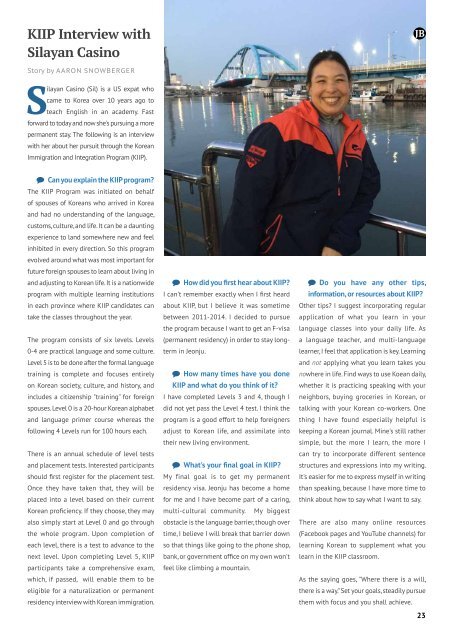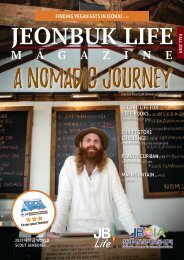You also want an ePaper? Increase the reach of your titles
YUMPU automatically turns print PDFs into web optimized ePapers that Google loves.
KIIP Interview with<br />
Silayan Casino<br />
Story by Aaron Snowberger<br />
Silayan Casino (Sil) is a US expat who<br />
came to Korea over 10 years ago to<br />
teach English in an academy. Fast<br />
forward to today and now she's pursuing a more<br />
permanent stay. The following is an interview<br />
with her about her pursuit through the Korean<br />
Immigration and Integration Program (KIIP).<br />
<br />
Can you explain the KIIP program?<br />
The KIIP Program was initiated on behalf<br />
of spouses of Koreans who arrived in Korea<br />
and had no understanding of the language,<br />
customs, culture, and life. It can be a daunting<br />
experience to land somewhere new and feel<br />
inhibited in every direction. So this program<br />
evolved around what was most important for<br />
future foreign spouses to learn about living in<br />
and adjusting to Korean life. It is a nationwide<br />
program with multiple learning institutions<br />
in each province where KIIP candidates can<br />
take the classes throughout the year.<br />
The program consists of six levels. Levels<br />
0-4 are practical language and some culture.<br />
Level 5 is to be done after the formal language<br />
training is complete and focuses entirely<br />
on Korean society, culture, and history, and<br />
includes a citizenship "training" for foreign<br />
spouses. Level 0 is a 20-hour Korean alphabet<br />
and language primer course whereas the<br />
following 4 Levels run for 100 hours each.<br />
There is an annual schedule of level tests<br />
and placement tests. Interested participants<br />
should first register for the placement test.<br />
Once they have taken that, they will be<br />
placed into a level based on their current<br />
Korean proficiency. If they choose, they may<br />
also simply start at Level 0 and go through<br />
the whole program. Upon completion of<br />
each level, there is a test to advance to the<br />
next level. Upon completing Level 5, KIIP<br />
participants take a comprehensive exam,<br />
which, if passed, will enable them to be<br />
eligible for a naturalization or permanent<br />
residency interview with Korean immigration.<br />
<br />
How did you first hear about KIIP?<br />
I can't remember exactly when I first heard<br />
about KIIP, but I believe it was sometime<br />
between 2011-2014. I decided to pursue<br />
the program because I want to get an F-visa<br />
(permanent residency) in order to stay longterm<br />
in Jeonju.<br />
<br />
How many times have you done<br />
KIIP and what do you think of it?<br />
I have completed Levels 3 and 4, though I<br />
did not yet pass the Level 4 test. I think the<br />
program is a good effort to help foreigners<br />
adjust to Korean life, and assimilate into<br />
their new living environment.<br />
<br />
What's your final goal in KIIP?<br />
My final goal is to get my permanent<br />
residency visa. Jeonju has become a home<br />
for me and I have become part of a caring,<br />
multi-cultural community. My biggest<br />
obstacle is the language barrier, though over<br />
time, I believe I will break that barrier down<br />
so that things like going to the phone shop,<br />
bank, or government office on my own won't<br />
feel like climbing a mountain.<br />
<br />
Do you have any other tips,<br />
information, or resources about KIIP?<br />
Other tips? I suggest incorporating regular<br />
application of what you learn in your<br />
language classes into your daily life. As<br />
a language teacher, and multi-language<br />
learner, I feel that application is key. Learning<br />
and not applying what you learn takes you<br />
nowhere in life. Find ways to use Koean daily,<br />
whether it is practicing speaking with your<br />
neighbors, buying groceries in Korean, or<br />
talking with your Korean co-workers. One<br />
thing I have found especially helpful is<br />
keeping a Korean journal. Mine's still rather<br />
simple, but the more I learn, the more I<br />
can try to incorporate different sentence<br />
structures and expressions into my writing.<br />
It's easier for me to express myself in writing<br />
than speaking, because I have more time to<br />
think about how to say what I want to say.<br />
There are also many online resources<br />
(Facebook pages and YouTube channels) for<br />
learning Korean to supplement what you<br />
learn in the KIIP classroom.<br />
As the saying goes, "Where there is a will,<br />
there is a way." Set your goals, steadily pursue<br />
them with focus and you shall achieve.<br />
23















